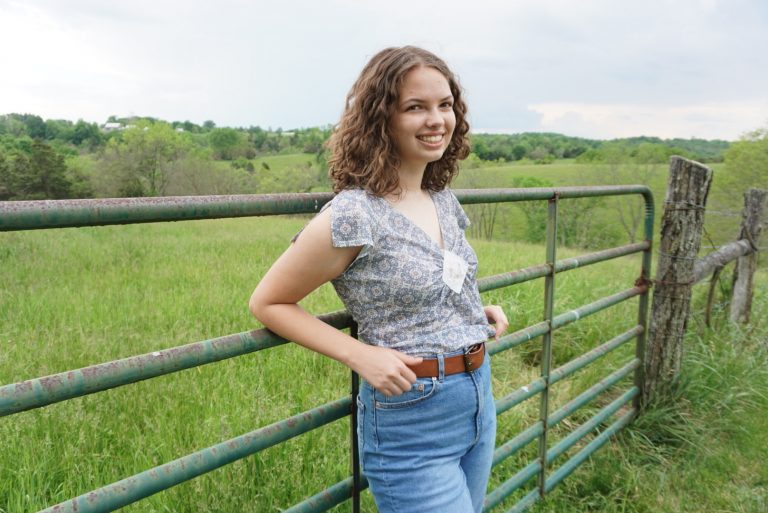Raychel Kool: "I was raised to believe"
Essays from the Rural Youth Catalyst Project

Queer and Nonbinary: Embracing Identity between Hayfields and City Lights
By Raychel Kool
I am thirteen, and I am pushing back a panic attack in the backseat of our crowded family van because two girls kissed in the book I am reading and it hits me like a freight train that I am like them. The realization that I was queer was followed by a year of trying to “pray the gay away,” and when I finally realized my queerness wasn’t going to change, my “I hate Kentucky” phase followed that. Still dealing with internalized homophobia borne of my rural Kentucky upbringing, I also bought into metronormativity, the (false) narrative that queer people can only find happy endings in big cities. I rejected the people and place that had so lovingly raised me because I believed it was impossible to be both queer and proud of my rural roots. Though I tried to suppress it, I couldn’t help but feel guilty turning my back on my hometown, which brought back the guilt surrounding being queer I had worked so hard to overcome.
I am fourteen, and the first time I say out loud that I am queer is to the trees. I am sitting on a hillside in our hayfield, half-expecting the ground to open up and swallow me whole, but of course that doesn’t happen. The sky doesn’t turn dark and there is no bolt of lightning to strike me down. Nothing changes. This realization helps me learn to love myself: the Earth that my rural upbringing has taught me to love and respect so much does not care how I identify. She will continue treating me as she always has, so why shouldn’t I do the same?
I am sixteen, and I come out to my older cousin while she is teaching me how to drive in her pickup truck. On a one-lane backroad, the sweet country air coming through the open windows has dried my wet cheeks, and she assures me there are other queer people where we live. Soon, the mainstream metronormative accounts that littered my Instagram feed and in part caused me to reject my roots are replaced with accounts like Queers Who Farm. Country musician and gay icon Kacey Musgraves’s song, “Follow Your Arrow,” becomes my anthem.
I am sixteen, and I try on my brother’s clothes in secret when I have the house to myself. Thinking about the lumps on my chest gives me a lump in my throat. Over the years, helping with the family garden and spending time in the woods has made me interested in plants, and in my exploration of that field, I learn about perfect flowers: flowers that are both male and female. A second freight train hits me when I realize I am nonbinary.
I am sixteen, and it’s my second week at Gatton, a residential STEM academy where I first start living as an out queer person, and my heart soars when I send my cousin a photo of a square dance flyer that reads, “gender-free calls, queer and trans folx welcome.” Still at Gatton, on a freezing night the following February, I call my cousin from the steps of a tall building to come out to her once again, this time as nonbinary. Looking over the city lights, a view I once thought would solve all my problems, I find myself longing for hayfields.
I am seventeen, and I just gave a presentation to Gatton’s Gender and Sexuality Alliance about growing up LGBTQ+ in a rural area. After the meeting, four people come up to ask me for my queer country playlist on Spotify. The email signature I use to send it has “they/them” written proudly at the bottom.
I am seventeen now, and I know that rural roots and a queer and nonbinary identity are both important parts of me that can and do coexist. I am seventeen now, and I love myself—all of myself.
Raychel Kool is from California, Kentucky, and they are currently studying as a high school senior at the Gatton Academy of Mathematics and Science. They are one of their school’s Gender and Sexuality Alliance officers, and they are interested in environmental science and rural studies.
Read Rural Youth Catalyst Co-Founder Kim Phinney’s I Was Raised to Believe essay “Go Back and Fetch What You Left Behind” at the Daily Yonder.
This past fall, the Rural Youth Catalyst Project announced a partnership with PBS American Portrait: A National Storytelling Project. PBS American Portrait is an ongoing, evolving initiative that is asking for people all across the country to contribute their experiences and perspectives to create a documentary series that captures the diversity and realities of our country. Utilizing themes from the American Portrait Project, we asked rural young people from across the country to respond to the prompt “I was raised to believe…”
The Rural Youth Catalyst Project is an independent working group aligned with the Rural Assembly. Working nationally, the Rural Youth Catalyst Project aims to strengthen and create opportunities that allow rural and Native youth to realize their hopes and dreams while remaining in or returning to their communities.







